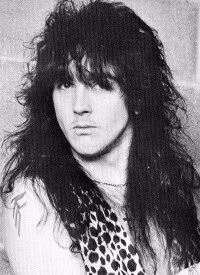FIBM: What are your 3 most fond memories of being in
Keel?
RK: There are so many - there's no way I can narrow them down to three.
Signing your first major label recording contract, seeing your albums climb the charts and having your songs all over
the radio and MTV?playing in front of 86,000 at the Texxas Jam opening for Van Halen....playing Madison Square Garden
sold out three nights in a row....headlining our sold out tour of Japan....watching the lights go out on the Eiffel Tower
after a sold-out show in Paris.....not to mention all the laughs, high fives, good friendships and other dreams come true. Pick
any three of those memories you like, they are all my favorite.
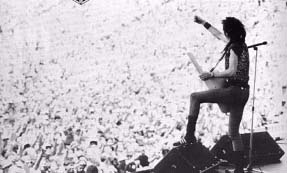 Ron, playing to 86,000, at the Texxas Jam
FIBM: Anything you wish you would have done differently in the Keel days?
RK: Of course. Mostly just little things - I remember spending $30,000
one month just rehearsing, with full production, sound, lights, a basketball court in our rehearsal room....we should
have just rented a barn in the middle of nowhere for $500 bucks and pocketed the rest....
FIBM: On to Fair Game, your post-Keel band. Did you ever mix
business with pleasure? If not, how did you not? If so, no explanation needed.
RK: I'll leave that to everyone's imagination.....if I did, I would never admit it....
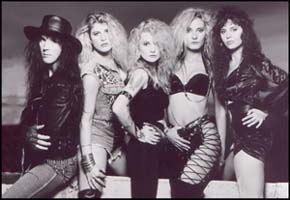 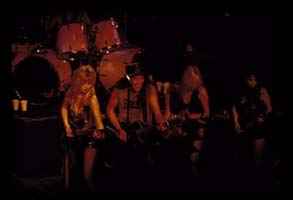 Fair Game
FIBM: How did the Saber Tiger release come about and how did
the fans in Japan react to hearing the thunder-god vocals of Ron Keel, after all those years?
RK:
Japanese guitar star Akihito Kinoshita had just signed a big deal with Fandango Records, and they were looking
for an American vocalist to do the album. I had dropped off the radar in Japan when I started singing Country
music, and had a good reputation and large following there. I was singing Country music in Arizona at the time
they contacted me, and I had just come home from a brutal gig where I sang for five hours for something like
fifty bucks. I'd had a few cocktails, as I do from time to time, and when I came home there was a fax on my
desk that read something like, "Hello, this is Tosh Sakabe from Fandango Records in Japan, we have just signed
guitar star Akihito Kinoshita and we are wondering how much you would charge us to make contract to sing on his
new album. Please call us, " and there was a phone number.
Well, I had a couple more cocktails, and I called them - it was the middle of the night
for me, but mid-afternoon in Japan - and spoke to Sakabe-san, and he reiterated what he had said in the
fax: "How much you charge to make contract to sing on this album,". I told him I'd do it for $75,000....he
said he'd discuss it with his boss and call me right back. I had a couple more cocktails, and then he
called back, and said "We give you $30,000," and I said "Hell Yes, I'm there..."
I love that album, and it remains my finest metal moment. I never toured with the band, so the only was
to gauge fan response was by chart position and sales, both of which were very good. The whole experience
was extremely taxing on me physically and vocally, but incredibly rewarding and one of the most interested
and satisfying projects of my career.
FIBM: Is the cd still in print and do you receive royalties
for sales, or did they just pay you for the session?
RK:
I was paid the flat fee for the session, but also wrote all the lyrics, for which I should be receiving royalties.
They sent them the first year, but nothing since....they even re-recorded the album with a Japanese singer, used all my
lyrics, and never sent me a dime, but I got almost 40K out of the deal, great memories, and a great album, so I'm cool
with it. I would like to release the disc myself to make it available for fans who might hesitate to shell out forty or
fifty bucks for the import.
FIBM: Did your latest band, IronHorse, recently sign with a record label?
If so, which one and what does that mean to you?
RK:
IronHorse has licensed the "Bring It On" CD to Rock Candy Records in Europe, the UK, and Japan....there will be some significant
changes in the album: it will be remastered by Jon Astley, who has remastered the catalogs of Judas Priest and The Who; it
will be resequenced with new material added; new album cover artwork, photos, and the title of the release will now be
"American Thunder", which is one of the tracks form the album. The guys at Rock Candy Records, Derek Oliver & Dante Bonutto,
are very well respected and experienced in all aspects of this business, I've known them since the KEEL days, and I'm very
excited to be working with them. They wanted to work with IronHorse for all the right reasons - because of the unique nature
of this band, because there's nothing else like it - a true hybrid of southern rock, metal, and country. There are hundreds
of melodic rock albums released every year, but IronHorse stands tall in a new genre all its own.
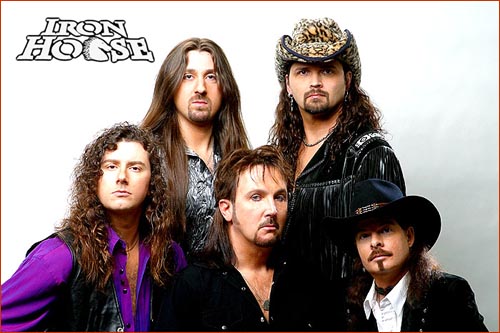
FIBM: What are the benefits of signing with a label, rather than financing the
project yourself? I realize this may sound like a stupid question, but considering the fact that you have name
recognition, couldn't you realistically, sell less independently, but make more than you might on a major? Or
hire the staff to promote as the labels do, such as radio promoters and so on?
RK: The IronHorse CD was financed by ourselves and investors, but as you know, I'm already spreading myself too thin with all my musical
endeavors....it's taken me two months to respond to this interview! Some of my future projects, such as the Ron Keel
Anthology, DVD compilation, and acoustic solo album will be done in-house on a smaller scale. But an act like
IronHorse deserves a lot more, and needs to get a shot at competing in the big leagues.
FIBM: Your thoughts on Jamie St. James joining Warrant. Have you talked to him since
and has he forgotten that Black n Blue was a great band?
RK: I think it's great that Jamie & Warrant have joined forces, and I'm looking
forward to hearing their new music. It's a great match, and I'm happy for him....Jamie will always be proud of Black n Blue
and I guarantee you he'll never forget - but like all of us, we have to live in the present and point ourselves toward the
future. The past is history, but our accomplishments and experiences can never be taken from us - our job is to keep on
creating, keep on singing and performing, enjoying our lives and chasing our dreams.
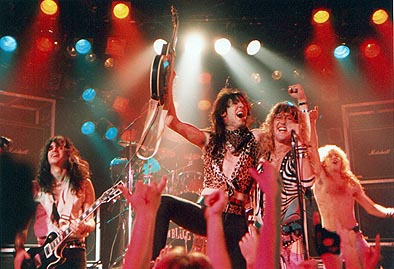 Marc Ferrari, Ron Keel, Jamie St. James, Bret Michaels
Marc Ferrari, Ron Keel, Jamie St. James, Bret Michaels
THE FAST 5
FIBM: What is your most disgusting habit?
RK: Smoking.
FIBM: What is the most feminine thing you do?
RK: I really like to cook and spend time in the kitchen. Is that more feminine than wearing makeup?
FIBM: If there is a God, what is the first question you would ask God when you arrive?
RK: If there is a God, I doubt I'll get the chance to ask him anything...but if there is,
and I did, I would really be stupid if I didn't drop to my knees immediately and ask for forgiveness.
FIBM: Greatest Rock band of all time?
RK: The Beatles.
FIBM: What were you doing 40 minutes before you sat down to do this interview?
RK: Working on the computer, fighting a losing battle to catch up on business and correspondence.
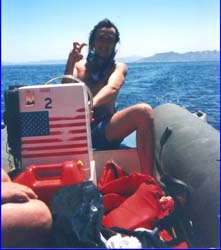
|
